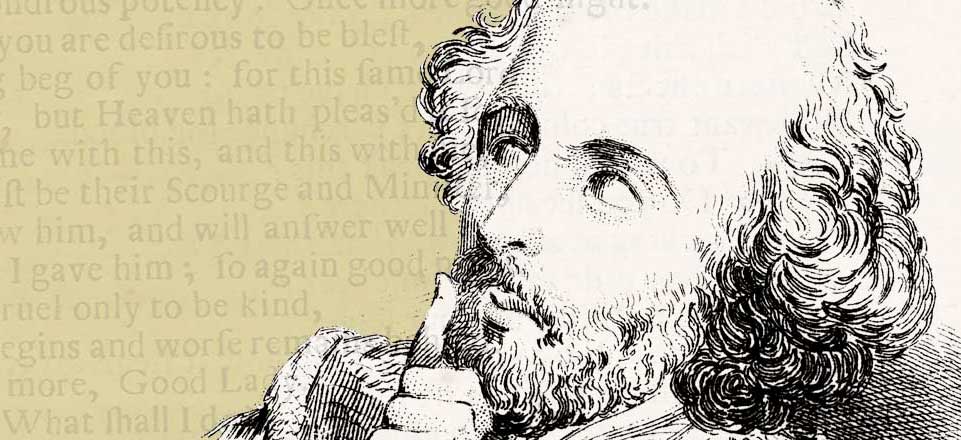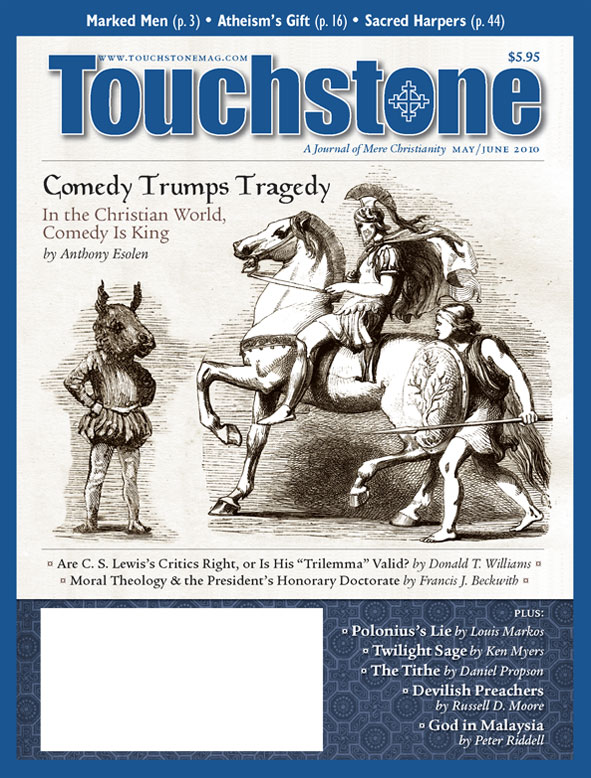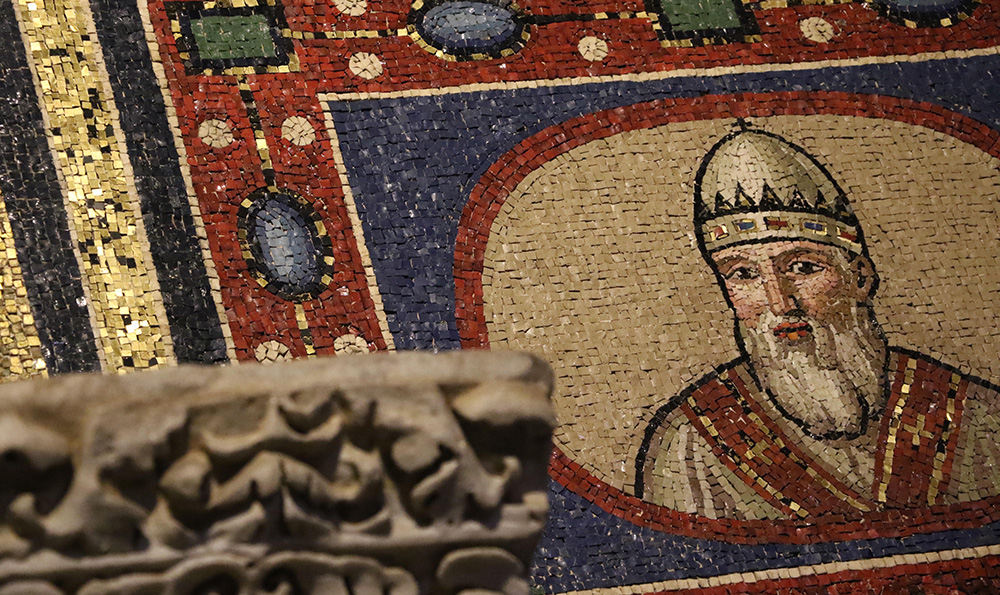View
Polonius’s Lie
Louis Markos on the Image of God & the Thine Own True Self
Poor William Shakespeare. For four centuries, over-eager readers have wanted to pin down the bard as a sensualist or a moralist, a believer or a skeptic, an idealist or a cynic, a materialist or a supernaturalist, a monarchist or a republican. And the list goes on.
A young man reads Macbeth’s words, “[Life] is a tale/ Told by an idiot, full of sound and fury,/ Signifying nothing,” and muses, “Will and I share the same bleak view of human existence.” Or a young girl savors every passionate word of the balcony scene in Romeo and Juliet and sees Shakespeare confirming her belief that romantic love excuses all impulsive and rash behavior. What these readers overlook is that Shakespeare himself does not speak these lines, but gives them to characters in particular contexts that militate against their being taken at face value.
Perhaps the most egregious error is made by the college student who discovers in a famous line from Hamlet the sacred formula for a happy life: “This above all: to thine own self be true.” Alas, many others besides the college student—a large percentage of Americans, I would submit—have taken these words to heart as a priceless gem of wisdom from the lips of the divine bard.
But, again, they are not spoken by Shakespeare. They are spoken by a pompous and obsequious courtier named Polonius, who tacks them on to the end of a rambling list of clichéd and hackneyed proverbs that have little or no influence on the object of his sermon: his rakish son Laertes. Polonius is by no means a figure through whom Shakespeare would offer good counsel on how to become a noble and virtuous person. On the contrary, Polonius, though not actively evil, stretches truth and justice on the rack of expediency and is not above using his daughter to further his position at court. In being true to himself, Polonius sets in motion the events that lead to the madness and suicide of his daughter, the death of his son, and his own ignominious murder.
As self-help gurus go, Polonius is a resounding dud; yet countless individuals, including Christians, persist in quoting his advice as the key to personal success. “To thine own self be true” has even become a justification for any word, thought, or deed that violates biblical standards.
East-of-Eden Advice
If Adam and Eve had resisted temptation and remained in the Garden, then Polonius’s advice would be thoroughly sound. Indeed, when Dante reaches the Garden of Eden that rests atop the mountain of Purgatory, Virgil, knowing that Dante has been purged of all remnants of the seven deadly sins, advises him to be true to himself in the most extreme way possible:
Your judgment now is free and whole and true;
To fail to follow its will would be to stray.
Lord of yourself I crown and mitre you.
(translator: Anthony Esolen)
Restored to his paradisiacal state, his heart and mind cleansed of all sin, Dante is now free to follow whatever impulse prompts him. He can no longer go off track, for his will is pure and responds as it should to the design of his Creator. He is now as God made him in the beginning, and Virgil is wholly justified in giving the advice he does.
But for a Christian clergyman or counselor to give this advice to an ordinary sinner would be foolishly naïve, criminally irresponsible, or borderline heretical. In our fallen state, the last thing we should do is follow our impulses. If we do, we will not find true happiness, but will bring down misery upon ourselves, our family, and our community.
It is common in our day to believe that if something is “natural” it must be good, but many of the things that come naturally to us—like pride, greed, lust, sloth, envy, anger, and gluttony—are good neither for us nor for the people whose lives we touch. “Human nature,” asserts Katherine Hepburn’s feisty character in The African Queen, “is what we were put on earth to overcome.”
As creatures made in the image of God, we have an almost unlimited potential for goodness and self-sacrifice, but our sinful nature continually leads us away from the path of righteousness, so that we mar the divine image. Like St. Paul, we find to our dismay that the evil we would not do, we do, and the good that we would do, we do not.
As long as we wrestle with and within that paradox, we will remain human and our hearts will remain open to receive God’s grace. But the moment we declare our sinful, fallen nature to be identical to our original, God-fashioned nature, we cease to be full human beings.
Two Selves
What, then, shall we say? If we should not strive to be true to ourselves, what should we strive for? Let us, instead of saying, “To thine own self be true,” say rather, “To thy true self be true.” For there is a self that we should strive to be true to, but it is not the depraved self that so quickly falls prey to the lust of the eye, the lust of the flesh, and the pride of life. The self to which we should be true is the one made in the image of God—the self that lived in the Garden before the Fall and that will live again in the New Jerusalem.
How shall we know that true self? Not by indulging the sinful nature, but by resisting it, by denying it, by laying it at the foot of the Cross. Michelangelo was wont to say that his job as a sculptor was to release the true image hidden within the marble. The Holy Spirit, too, is a sculptor, and if we let him, he will carve away at our sinful nature until the true self is revealed.
Many of us have come increasingly to define ourselves by our phobias, our brokenness, our perversions, our sins. We have lost the language of teleology, of purpose. Instead of asking what our true and final end is (“to glorify God and enjoy him forever,” as one of the great catechisms defines it), we are concerned only with what we are now, in this present moment. And so we allow ourselves to be guided by the impulses and desires that we felt five seconds ago, rather than looking ahead to the purpose for which we were fashioned.
We would not use the back of a Stradivarius violin as a portable desk, for we know that the end for which it was built was to produce beautiful music, and that if we used it as a desk, we would destroy that purpose. We are rightly horrified by sexual slavery, for God did not give us our sexual identities (both body and soul) for such purposes, and when those identities become commodities to be exploited, the true self becomes crushed and mangled.
Yet so often we don’t think twice about affirming and even championing impulses of our fallen self that, when indulged and allowed free reign, mar the true self and prevent us from growing toward our true purpose and final end. Consider the young man who once struggled against homosexual attraction but now surrenders to his disordered desire and defines himself as a homosexual; or the young woman who has so indulged her vanity that she now sees herself as nothing more than a media-constructed object; or the businessman who has so indulged his greed that he now finds his identity and self-worth in the make of his car and the zip code of his house; or the politician or lawyer who prides himself on being able to spin the truth and to make dubious arguments sound valid; or the artist who has made his art an idol and so believes in the sanctity of his own self-expression. All of these have followed Polonius’s advice, and all have sacrificed their true selves.
A Better Maxim
In Orthodoxy, G. K. Chesterton laments that our modern world has got things exactly backwards: Instead of teaching our children to believe the truth and doubt themselves, we teach them to doubt the truth and believe in themselves. The goal of modern education is not to teach children to think true thoughts, but to “think for themselves.” No wonder so many of us have lost our ability to distinguish our fallen selves from our true selves. No wonder we’ve bought the lie that by indulging what is marginal and aberrant, we can discover what is central and true.
The next time you are tempted to follow Polonius’s mandate, place it alongside the far more accurate Socratic mandate: “Know thyself.” And then meditate on this sober warning from Proverbs: “There is a way which seemeth right unto a man, but the end thereof are the ways of death” (14:12). •
Louis Markos , Professor in English and Scholar in Residence at Houston Baptist University, holds the Robert H. Ray Chair in Humanities. His 19 books include Lewis Agonistes; Restoring Beauty: The Good, the True, and the Beautiful in the Writings of C. S. Lewis; On the Shoulders of Hobbits: The Road to Virtue with Tolkien and Lewis; and From A to Z to Narnia with C. S. Lewis.
subscription options
Order
Print/Online Subscription

Get six issues (one year) of Touchstone PLUS full online access including pdf downloads for only $39.95. That's only $3.34 per month!
Order
Online Only
Subscription

Get a one-year full-access subscription to the Touchstone online archives for only $19.95. That's only $1.66 per month!
bulk subscriptions
Order Touchstone subscriptions in bulk and save $10 per sub! Each subscription includes 6 issues of Touchstone plus full online access to touchstonemag.com—including archives, videos, and pdf downloads of recent issues for only $29.95 each! Great for churches or study groups.
Transactions will be processed on a secure server.
more from the online archives
calling all readers
Please Donate
"There are magazines worth reading but few worth saving . . . Touchstone is just such a magazine."
—Alice von Hildebrand
"Here we do not concede one square millimeter of territory to falsehood, folly, contemporary sentimentality, or fashion. We speak the truth, and let God be our judge. . . . Touchstone is the one committedly Christian conservative journal."
—Anthony Esolen, Touchstone senior editor










